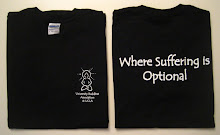
I recently saw this t-shirt at Buffalo Exchange, a store that buys and sells used clothing, and I didn't know what to think. At first, I thought it was funny though not the most witty t-shirt I've ever seen. Then, I began to wonder what it's supposed to mean. Shake your Buddha? Obviously, the designers played off the word "booty" with "Buddha", but why? The phrase "Shake your Buddha" doesn't even make sense; the closest possible meaning I can think of is flaunting your Buddhist faith in the same way one would flaunt their "booty" when they shake it. Though that may be the meaning behind this shirt, I think I took the phrase a little too literally.
The way I see it, the only reason the designers incorporated the word and image of Buddha is because he is a pop-culture, fashion icon. One of my favorite Buddhism-related articles, "Buddhamania" featured in the LA Times, tries to make sense of modern pop-culture using the Buddha as a fashion and decorative icon. What was supposed to be an icon of an enlightened teacher revered for rediscovering and spreading Buddhism has now become a popular image completely disconnected from its religious context. So the question is, is that good? Is it disrespectful to the Buddha to wear a t-shirt that says "Shake your Buddha"?
Personally, I tend to believe that wearing a t-shirt like this one isn't disrespectful. Its message isn't meant to be crude or profane. If anything, I think it's great that icons of the Buddha are appearing more often in Western culture, even if it is out of religious context. It helps spread awareness of Buddha's existence and though there may not be any accurate historical or religious information attached to the icon, the image eventually leaves a lasting impression. The more they see the Buddha out of context, the more people will one day wonder who is the Buddha anyways and what does Buddhism teach? If there were no Buddha icons in form easily accessible to the mainstream public, such as fashion and pop culture, such thoughts and curiousity over the Buddha may never arise. If images of Buddha never appeared in Western pop culture, Amy Winehouse and the Beckhams may never have turned to Buddhism when their friends suggested it.
Though sometimes immature and shallow, popular images of the Buddha give people unfamiliar with Buddhism an early sense of distant familiarity with the religion so that they may feel more comfortable approaching it if ever necessary. I believe it is our job (as Buddhists, a Buddhist organization, the Sangha, and just anyone involved in Buddhism) to welcome those intersted in learning about Buddhism and guide them to the appropriate resources for their faith. That is what I hope we can do as the UBA.






No comments:
Post a Comment